[Live Lab] Streaming 101: Hands-On with Kafka & Flink | Secure Your Spot
比較する
Apache Kafka® の費用と機能に関する Confluent Cloud と Amazon MSK の比較
Apache Kafka® の価値を完全に実現するには、専用のエンジニアリングリソースと分散システムに関する高度な専門知識が必要です。フットプリントが拡大するにつれて、Kafka の自己管理は持続不可能なバランスをとる行為となり、オーバープロビジョニングされたクラスターに資金を費やすか、計画外のダウンタイムのリスクを冒すかの間で行き詰まることになります。この詳細な Confluent Cloud と Amazon MSK の比較では、それぞれのスケーラビリティ、復元力、プラットフォーム機能の比較、そして Confluent が自己管理型 Kafka の総所有コストを40~70%削減する方法を示します。
自己管理のホスト型 Apache Kafka® と比較して 70% 以上効率的に運用
リアルタイムデータパイプラインや AI エージェントを構築する際には、Kafka が理想的な選択肢です。その分散設計は、高スループット・低遅延のワークロードを処理するように構築されていますが、コストのかかるオーバープロビジョニングや停止のリスクを冒すことなく、大規模に管理、保護、最適化するための深い専門知識も必要です。
Kafka の共同作成者によって設立された Confluent は、300万時間分のエンジニアリングを投資し、Kafka をクラウドで最大70%効率的に運用できるように再設計しました。その結果、誕生したクラウドネイティブの Kafka エンジンである Kora は、完全マネージド型のデータストリーミングプラットフォームを強化し、次を実現します。
-
インフラストラクチャコストを半分以上削減するサーバーレスで自動スケーリングするクラスター
-
自己管理型のシングルテナントクラスターの3倍のリソース効率
-
自己管理型と比べてクラスターのレイテンシが最大50%低減し、使用率がさらに向上
-
ネットワーク費用を削減するための最適化されたルーティングと API の統合
現在、Kora は AWS、Google Cloud、Microsoft Azure で毎日3兆件以上のメッセージを処理する30,000点の Confluent Cloud クラスターを稼働させています。
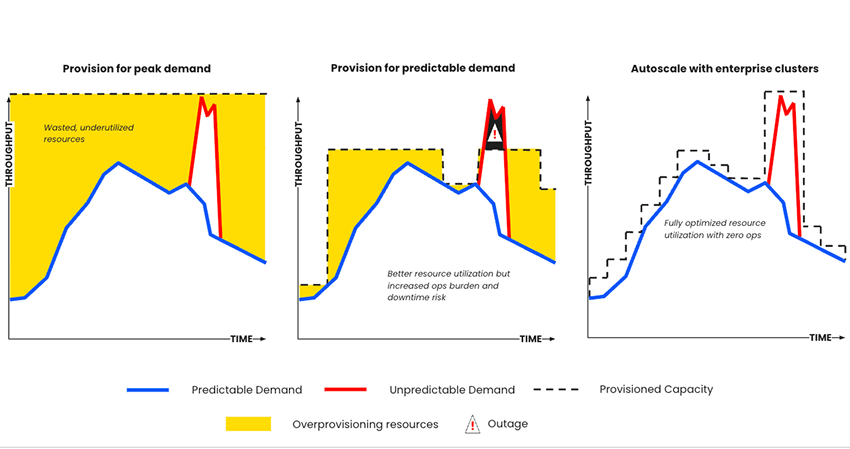
MSK Zookeeper の移行 : 重要なアップデートを戦略的優位性に転換
Kafka の ZooKeeper のサポートは2026年5月に終了するため、Zookeeper ベースのクラスターを使用しているすべての Kafka ユーザーは、古いバージョンの Kafka での実行を回避するため、KRaft へ全面的に移行する必要があります。
これは MSK のお客様にとってどのような意味を持つのでしょうか?
-
ZooKeeper ベースのクラスターは、セキュリティパッチやバグ修正を含む重要なアップデートをオープンソースコミュニティから受け取れなくなります。つまり、MSK の顧客は、潜在的なセキュリティと管理の問題を抱えた自己管理型の Kafka を実行することになります。
-
MSKにはインプレースアップグレードパスがありません:MSKのお客様は、新しいKRaft対応クラスタを立ち上げ、データとワークロードを手動で移行する必要があります。
-
MSK Express への移行はシームレスではありません:MSK Provisioned Standard から MSK Express への移行には、追加の労力が必要です。
Confluent に移行すべき理由とは?
この重要な移行は、再評価を行うのに最適な時期です。基本的なサービスにとどまるためだけに、なぜ大変な作業をしなければならないのでしょうか?フルマネージド型のデータストリーミングプラットフォームに移行すると、高度な機能をフル活用し、コストも大幅に削減できます!
-
完全マネージド型でクラウドネイティブ : プロビジョニング、アップグレード、スケーリング、パーティションのバランシングなどの Kafka のライフサイクル全体を自動化するため、ユーザーは運用ではなくアプリケーションに集中できます。
-
優れたサポート : 専門家によるファーストパーティの Kafka サポートと MSK よりも10倍優れたストリーミングプラットフォーム全体をカバーする 99.99% の SLA を提供します。
-
豊富な統合とエコシステム : より多くの AWS サービス統合に加え、マルチクラウドおよび SaaS ソリューションのサポートを含む最大規模のマネージド Connector ライブラリを提供します。
-
データガバナンス : Schema Registry などの完全なガバナンス機能スイートを提供し、データの品質と一貫性、すべてのデータストリームの信頼できる一元的なソースを保証します。
-
あらゆる環境に対応 : AWS、Azure、Google Cloud にわたるマルチクラウドデプロイメントをサポートし、クラウドとオンプレミス環境にまたがるハイブリッドアーキテクチャにも対応します。
-
TCO 削減 : プライベートネットワークインターフェイス (PNI) や自動スケーリングなどの機能を活用して Confluent Cloud に移行。Confluent は、AWS MSK と同等以下の価格を保証します。
「Confluent を導入したことで、年間コストを69%削減できました。また、会議や季節ごとの予測に費やす数か月の計画作業時間も節約できました。」Justin Dempsey 氏、シニアマネージャー、SAS Cloud
「当社のグローバル IPv4 スキャンプラットフォームである Horus を Confluent 上に構築して以来、オープンソースの Kafka や MSK と比べて100万ドル以上を節約できました。」
Jared Smith 氏、脅威インテリジェンス担当シニアディレクター、SecurityScorecard
「Confluent を使用することで、ブラックフライデーのような大規模な小売イベントや大規模な新規顧客の獲得時に真の弾力性を実現できます。さらに、堅牢な SLA によって、常に高い可用性と信頼性が保証されます。」
Ian Compton 氏、テクノロジーディレクター、RevLifter
Kafka の所有コスト – MSK と Confluent の比較
社内での採用が拡大し、Kafka のフットプリントが拡大するにつれて、チームは以下のことにさらに多くの時間とリソースを費やすことを強いられます。
-
クラスタープロビジョニングの計画、サイジング、管理
-
ソフトウェアのパッチ適用とアップグレード
-
可用性のためのフェイルオーバー設計と計画
-
リスクの高いガバナンスとセキュリティのギャップの解消
-
信頼性のための計画と最適化
-
手動ロードバランシング
Kafkaの完全な価値を実現するには、大規模な本番稼働に到達するまでに平均2年以上、プラットフォームの開発と運用に300万~500万ドルのコストがかかります。Confluent Cloud と Amazon MSK はどちらも、この運用上の負担を軽減することを約束します。しかし、「マネージド」Kafka サービスはどれも同じではありません。クラウドサービスプロバイダーによるホスト型 Kafka を選択しても、チームがあらゆる重労働から解放されることはありません。
このマネージド Kafka サービスの比較では、真のマネージドサーバーレス Kafka と、投資収益率が257%で6か月以内に投資回収が可能なデータストリーミングプラットフォームでどれだけ多くのことができ、どれだけ節約できるかをご紹介します。
| Confluent Cloud | Amazon MSK | |
|---|---|---|
| まとめ | Confluent は、Kafka Cluster と Connector インスタンスをスケーリングするための自動化機能により、ほとんどの手動操作の負荷を軽減します。 | Amazon MSK は、MSK Serverless クラスターであっても、デプロイメントタスクの自動化機能が限られているため、運用負担は高いままです。 |
| 自動化された製品機能と手動操作およびカスタム開発の比較 |
自己管理型 :
すべてのクラスターで自動化:
カスタム:
* すべての Confluent Cloud クラスターで可能 |
自己管理型 :
カスタム:
自動:
* MSK Serverless クラスターでのみ |
| 選択の自由 | AWS、Google Cloud、Microsoft Azure で利用可能 | AWS でのみ利用可能 |
Confluent Cloud と Amazon MSK における管理、監視、メンテナンスの比較
MSK はいくつかの運用上の問題を解決していますが、いまだ制限が多数存在します。自己管理またはホスト型 Kafka の使用には、次のような多大な直接的および間接的なコストがかかります。
- オーバープロビジョニングされたクラスターによる高額なインフラストラクチャ支出:変動する需要に対応するためにオーバープロビジョニングが必要、コンピューティングを増やさずにストレージを拡張できない、手動構成によるパフォーマンスの低下、リバランス、アップグレードとパッチ適用
-
運用負担と制約のあるリソース:プロビジョニングとキャパシティプランニング、アップグレードとモニタリングに費やす高価な時間とリソースとビジネスの差別化のバランス、Kafka 人材の採用、雇用、維持にかかるコスト
-
計画外の停止:Kafka がより多くのユースケース、アプリケーション、データシステム、チーム、環境にわたるにつれて、コストのかかるダウンタイムとセキュリティ侵害のリスクが高まります。
これらのコストは、価値実現までの時間の遅延や TCO の増加を引き起こし、予期せぬダウンタイムやセキュリティ侵害、データ損失による収益損失のリスクの増大につながります。
運用上の負担を軽減し、一般的な Kafka の課題を解決するという点で、Confluent Cloud と Amazon MSK を比較してみましょう。
Kafka と Confluent と MSK を比較するホワイトペーパーを読む
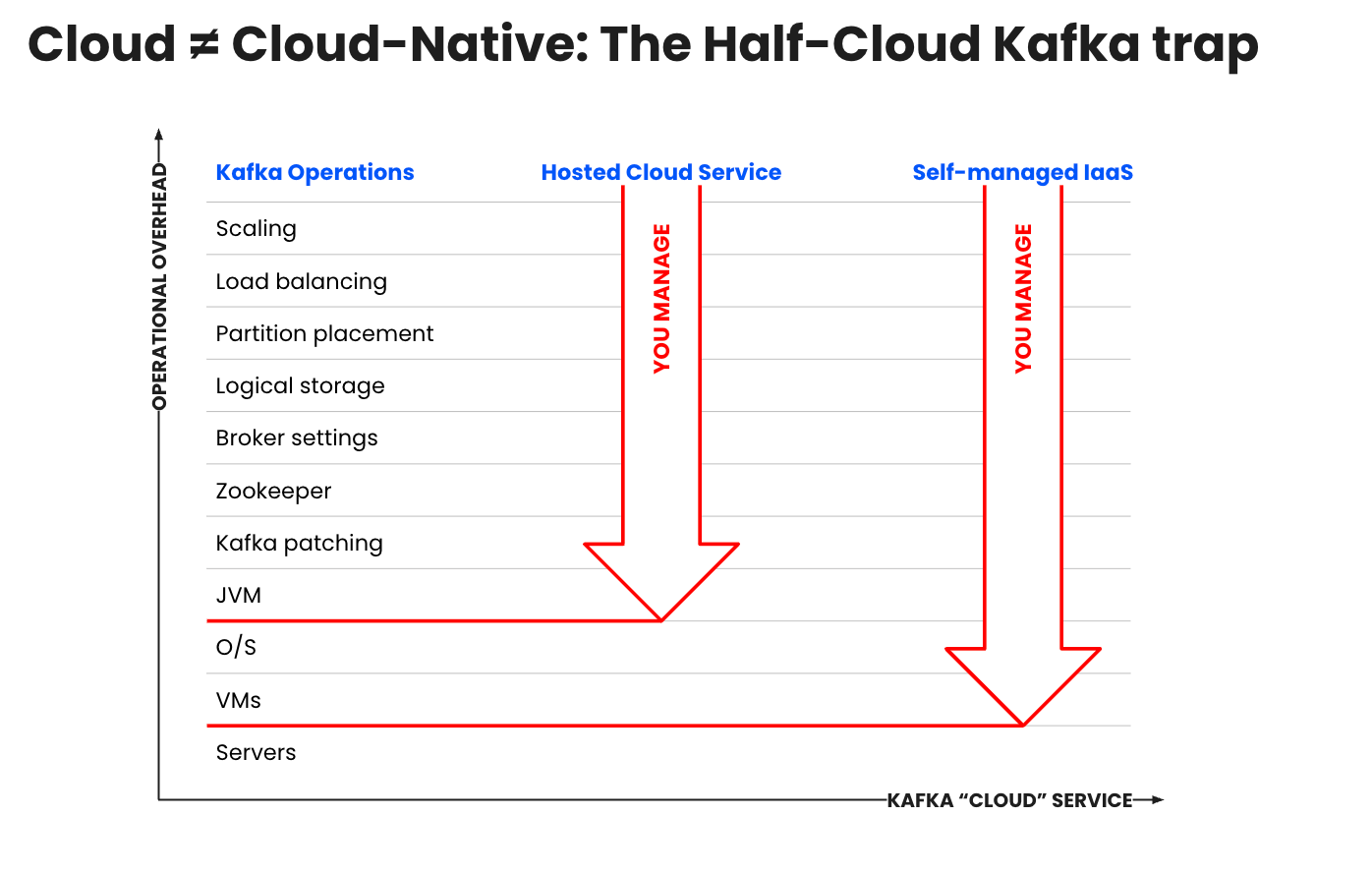
| サービス | Confluent Cloud | Amazon MSK | MSK サーバーレス |
|---|---|---|---|
| プロビジョニング | Kafka、Schema Registry、Flink のセルフサービスおよびオンデマンド | セルフサービス、オンデマンド、Kafka のみ | セルフサービス、オンデマンド、Kafka のみ |
| 自動スケーリング | あらゆるワークロードに適したサイズのサーバーレス・自動スケーリングクラスター | 手動スケーリング | 制限されたクォータ (200/400 MBps) への柔軟なスケーリング |
| クラスタの種類 | あらゆるワークロードとユースケースに対応する柔軟でコスト効率の高いクラスタータイプ | 標準クラスター Express クラスターはどちらも手動でスケーリングが必要です | MSK Serverless クラスターは、MSK の事前プロビジョニングされたクラスターで、予測不能でミッションクリティカルなワークロードに適しています |
| Infrastructure as Code | コントロールプレーンとデータプレーンの両方に対応 | コントロールプレーンのみ | コントロールプレーンのみ |
| インフラストラクチャの監視 | プロアクティブな監視 | 手動監視 | プロアクティブな監視 |
| Topic のモニタリング | 無料の事前集計された指標 | Topic レベルの指標は追加料金が必要 | デフォルトの監視は無料 |
| アップグレード | 常に最新の安定バージョン | 制限付きバージョンサポート | 制限付きバージョンサポート |
| ソフトウェアへのパッチ適用 | プロアクティブな修正 | 事後対応型修正 | 事後対応型修正 |
| クラスターの拡張 | 柔軟なスケーラビリティ | 手動でのデータリバランシング | 柔軟なスケーラビリティ |
| コネクタのスケーリング | 事前構築済みで完全マネージド型 | 自己開発および管理 | 自己開発および管理 |
Confluent Cloud と Amazon MSK はどのようにクラスターのサイジングを簡素化しますか?
-
Confluent Cloud はスループットベースのサイジングを採用しています。これにより、面倒なパフォーマンステストが不要になり、柔軟にスケーリングでき、使用した分だけ支払うクラスターでインフラストラクチャのコストを削減できます。
-
MSK Provisioned は Broker ベースのサイジングを使用しています。自動スケーリングの制限により、後で複雑な拡張の必要性を減らすために、パフォーマンステストを実行して Broker の種類と数を選択し、インフラストラクチャをオーバープロビジョニングして時間とリソースを割り当てる必要があります(1日あたり4回の操作)。
-
MSK Serverless はスループットベースのサイジングを採用しています。Glue Schema Registry と Kafka Cluster をプロビジョニングします。コネクタと Kafka プロキシにはカスタム作業が必要です。
Confluent Cloud または Amazon MSK はどのようにプロビジョニングと管理を自動化しますか?
-
Confluent Cloud は、プラットフォーム全体にセルフサービスのオンデマンドプロビジョニングを提供します。Kafka Cluster を Schema Registry、Connect、Confluent Cloud for Apache Flink® を含む他の Confluent Cloud コンポーネントと一緒にプロビジョニングします。また、Terraform プロバイダーを使用して、コントロールプレーンリソース (クラスターや Schema Registry など) とデータプレーンリソース (Topics や ACL など) の両方の管理を自動化することもできます。
-
Amazon MSK はセルフサービスのオンデマンドプロビジョニングを提供しますが、Kafka のみを提供します。Kafka Cluster と Glue Schema Registry をプロビジョニングし、MSK Provision と MSK Serverless の両方のコネクタと Kafka プロキシに Flink Custom の取り組みが必要です。Terraform はコントロールプレーンのリソースをデプロイして管理することしかできません。データプレーンのリソースを管理するには、カスタムオペレーターとプロセスを構築する必要があります。
Confluent Cloud や Amazon MSK はすぐに使用できる監視機能を提供していますか?
-
Confluent Cloud は、プロアクティブなインフラストラクチャ監視と Topic 監視のための無料の集約メトリクスを提供します。Kafka の専門家によるプロアクティブなクラスター監視とメンテナンスにより、アプリ開発に集中できます。Infinite Storage により、ディスク領域関連の障害のリスクを軽減しながら、無制限のクラスターレベルのストレージ使用が可能になります。Topic およびクラスターレベルで事前に集計された最も重要な指標へのアクセスは追加費用なしで利用可能であり、Metrics API を使用して選択したサードパーティの監視サービスで指標を使用できます。
-
MSK Provisioned は、手動でインフラストラクチャを監視し、Topic レベルのメトリックを追加料金で提供します。CPU 使用率などの Broker メトリックを監視するためのリソースを割り当てて、クラスターのパフォーマンスをプロアクティブに管理します。ストレージ容量による障害を防ぐために、ディスク領域を監視してアラートを作成します。課金制で、Broker /Topic ごとのレベルの指標を手動で集計して、全体的な使用状況を監視します。
-
MSK Serverless クラスターには、プロアクティブなインフラストラクチャ監視と無料のデフォルト Topic 監視があります。プロアクティブなクラスターの監視とメンテナンスにより、アプリ開発に集中できます。Infinite Storage により、ディスク領域関連の障害のリスクを軽減しながら、無制限のクラスターレベルのストレージ使用が可能になります。CloudWatch コンソールを使用して、Topic レベルのメトリクスに無料でアクセスできます。これは、複数の AWS 製品を監視するための別のツールであり、Partition レベルのメトリクスや、Datadog や Dynatrace などの人気の監視ツールとのネイティブ統合は含まれていません。
Confluent Cloud と Amazon MSK での Kafka メンテナンスの処理方法は?
-
Confluent Cloud は常に最新の安定バージョンに更新され、バグや脆弱性は事前に修正されます。 Kafka、バグ修正、パッチ適用などを含む99.99%の SLA を提供します。
-
Amazon MSK には限定的なバージョンサポートと事後対応型の修正があります。MSK は Kafka リリースのサブセットのみをサポートしており、予定されている Apache リリース後に AWS がサポートを追加したら、手動でアップグレードを開始する必要があります。MSK は99.9%の SLA を提供し、選択されたバージョンの Kafka と、MSK 稼働時間 SLA でカバーされない Kafka ソフトウェアによる障害のみに対応することを選択しています。リリースのサブセットを採用すると、脆弱性を修正するためのリアクティブアプローチが強制されます。MSK Serverless クラスターでは、無停止のローリングアップグレードの一環として介入は一切不要です。MSK は Kafka リリースのサブセットのみをサポートしており、最新バージョンは不明で完全に抽象化されています。
Confluent Cloud と Amazon MSK はクラスターをどのように拡張および縮小しますか?
-
Confluent Cloud は、リソースを自動スケーリングし、クラスターに自動的に割り当てます。Confluent は、インフラストラクチャのコストを半分以上節約する柔軟性の高い自動スケーリングクラスターにより、スループットが GBps 単位にスケールアップまたはスケールダウンしても、Consumer のラグに対処します。クラスターコンピューティングのオーバープロビジョニングを排除し、無限のストレージで独自の保持制限を設定します。
-
Amazon MSK では、プロビジョニングされたクラスターと自社開発の自己管理型コネクタに対して手動でのデータリバランスが必要です。ブローカーをクラスターに追加した後、Cruise Control を使用した手動のデータ再調整プロセスが必要です。Tiered storage は利用可能ですが、ブローカーあたり最大16TBまで拡張可能な EBS ボリュームが必要で、Broker 数は最大30に制限されています。AWS からの明示的な技術サポートはなく自己構築またはコミュニティ構築のコネクタを使用します。基盤となる MSK Connect インフラストラクチャのみが含まれます。
-
MSK Serverless クラスターは一定のクォータまで柔軟にスケーリングできますが、それでも自己管理型コネクタが必要です。クラスターの自動リバランスにより、0MBpsから200MBpsまで簡単にスケールアップ/スケールダウンできます。Infinite Storage で Topic の保持率を上げても、クラスターコンピューティングのオーバープロビジョニングは不要です。
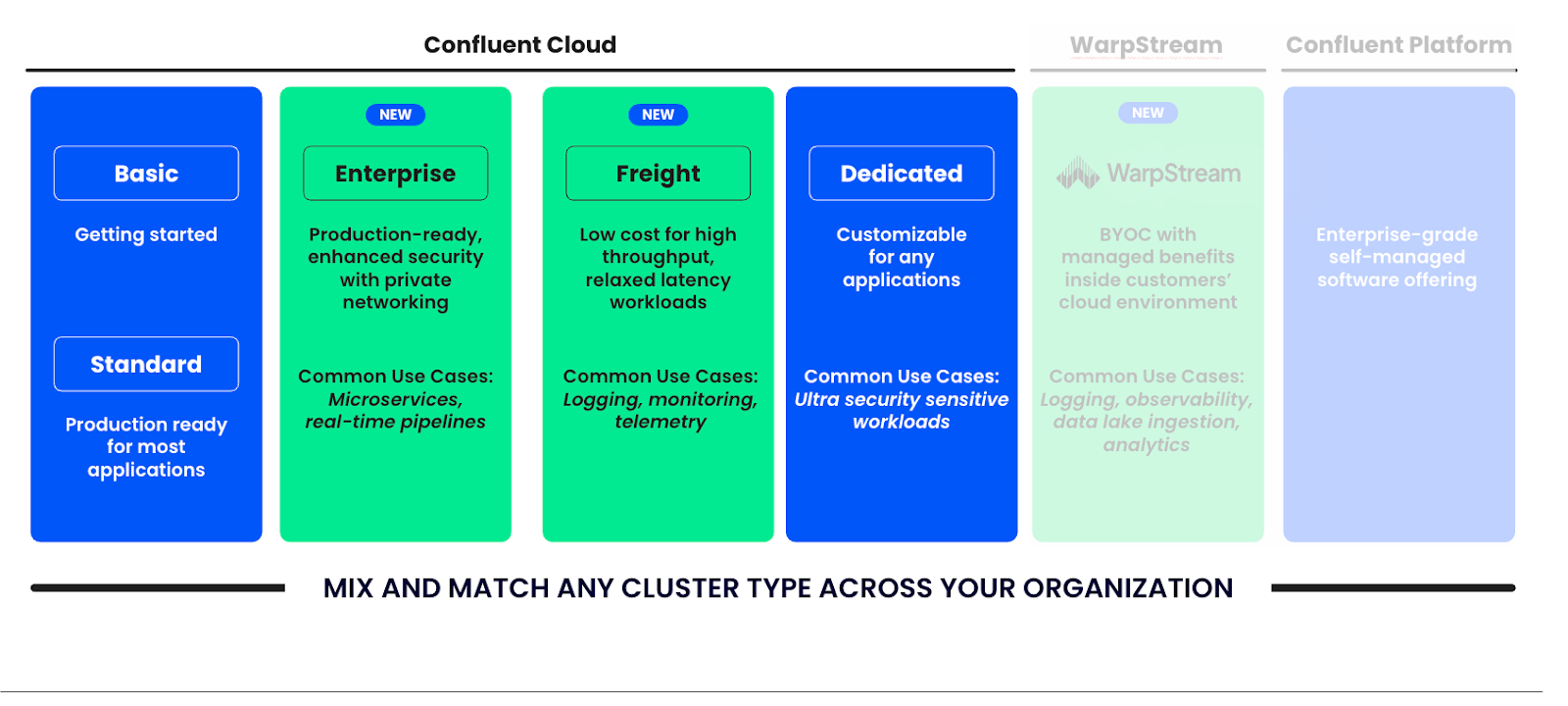
Confluent の完全なデータストリーミングプラットフォームと AWS でホストされた Kafka の比較
なぜ Confluent は業界全体で信頼されているのでしょうか?Confluent は、MSK の機能セットを超えるエンタープライズグレードの機能を提供し、完全なデータストリーミングプラットフォームを実現して、無数のデータストリーミングのユースケースを可能にします。
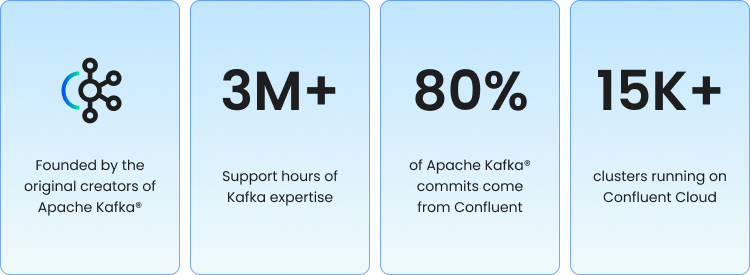
| サービス | Confluent Cloud | Amazon MSK | MSK サーバーレス |
|---|---|---|---|
| Kafka UI | 完全マネージド型 | 利用不可 | 利用不可 |
| 認証 | 広範な認証 | 広範な認証 | 制限付き認証 |
| 暗号化 | エンドツーエンドの暗号化 | サポートされていません | サポートされていません |
| Connectors | 事前構築済みで完全マネージド型 | カスタムビルドで完全マネージド型 | カスタムビルドで完全マネージド型 |
| データガバナンス | 完全マネージド型 | 利用不可 | 利用不可 |
| ストリーム処理 | 完全マネージド型 | 複雑さが増加 | 複雑さが増加 |
| ストリームからテーブルへのゼロ ETL | Tableflow で利用可能に | 利用不可 | 利用不可 |
Confluent Cloud と Amazon MSK はどのようなエンタープライズグレードのセキュリティ機能を提供しますか?
-
Confluent Cloud は、すべてのクラスタータイプに対して幅広い認証をサポートしており、 認証されたクライアントのみがクラスターへのアクセスを許可されます。Confluent Cloud は、認証メカニズムとして SASL/PLAIN と SASL/OAUTHBEARER (プレビュー) をサポートしています。Confluent Cloud のクライアント側フィールドレベル暗号化 (早期アクセス) は、クライアント上の機密データを暗号化し、クライアントとサーバーの両方で保護し、Producer とConsumer メカニズム間で移動するデータのセキュリティを維持することでセキュリティをさらに強化します。
-
Amazon MSK は、MSK Provisioned クラスターでは広範な認証を、MSK Serverless では限定的な認証をサポートしていますが、暗号化はサポートしていません。すべての MSK クラスターは認証されたアクセスのみを許可しますが、MSK Provisioned クラスターは認証メカニズムとして SASL/SCRAM、mTLS、IAM をサポートし、MSK Serverless クラスターは認証メカニズムとして IAM のみをサポートします。
Confluent Cloud と Amazon MSK が提供する Kafka Connector の種類は?
-
Confluent Cloud は 120点以上のプレビルド型 Connector と80点以上の完全マネージド型 Connector を提供します。オンプレミスおよびパブリッククラウドにわたる最新およびレガシーサービスと Confluent をシームレスかつ簡単に統合できます。120点以上の Connector の継続的に拡大するポートフォリオは、完全マネージド型コンポーネントとして、または Confluent サポート対象となる事前構築済みコンポーネントとして利用可能です。
-
Amazon MSK は、カスタムビルドの自己管理型コネクタのみをサポートしています。独自のコネクタをビルドするか、コミュニティが開発したコネクタの小さなサブセットからデプロイするオプションで、Kafka とデータサービスを統合できます。カスタムビルドのコネクタにはメンテナンスが必要で Kafka コミュニティコネクタは AWS テクニカルサポートの対象外です。
Confluent Cloud と Amazon MSK はどのようなガバナンス機能を提供していますか?
-
Confluent Cloud は、Stream Governance、データの可用性、整合性、セキュリティを管理する完全マネージド型サービススイートを提供します。Stream Governance は、Stream Lineage、Stream Catalog、Stream Quality という3つの主要な戦略的なコンポーネントに基づいて構築されています。Data Quality Rules が高品質のストリームを保証します。
-
Amazon MSK は、Kafka Topic 内のデータを管理するために、サポートのない無料のコミュニティツールや有料のサードパーティツールの使用を必要とします。 MSK にはリネージやカタログ機能がありません。MSK と MSK Serverless はデータ品質のために Confluent および Glue Schema Registry と統合されます。ただし、データ Producer が Schema Registry を使用してスキーマの進化を制御するように強制する Broker 側の Schema Validation、データストリーム内の個々のフィールド値を検証・制約する Data Quality Rules、異なる環境間でスキーマを同期するスキーマリンクが欠けています。
Confluent Cloud と Amazon MSK はどのようなストリーム処理機能を提供しますか?
-
Confluent はサーバーレスストリーム処理を Confluent Cloud for Apache Flink® で提供しています。ユーザーは Flink クラスターを作成するだけで、SQL などの言語を使用してストリーム処理を開始できます。Confluent Cloud は、完全マネージド型の AWS Lambda サービスもサポートしています。
-
Amazon MSK は Flink を使用したストリーム処理を提供しますが、管理がより複雑になります。 MSK は Apache Flink (MSF) のマネージドサービスをサポートしており、強力ですが、管理と運用がより複雑になります。ユーザーは、ネットワークを構成し、MSF Studio ノートブックを作成し、SQL のような構文を使用してジョブを作成し、コードをテストし、コードをパッケージ化し、S3 にアップロードし、アップロードされたコードから MSF アプリケーションを作成する必要があります。
Confluent によるハイブリッドマルチクラウドと AWS のベンダーロックインの比較
クラウドネイティブのデータストリーミングを活用し、単一のクラウドプロバイダーに縛られることなく、スケールに応じて構築できます。Amazon MSK (AWS でのみ利用可能) とは異なり、Confluent はオンプレミス、ハイブリッド、マルチクラウドのアーキテクチャのあらゆる組み合わせをサポートし、シームレスなデータ相互運用性を実現する、真のデプロイの柔軟性を提供します。
-
AWS、Microsoft Azure、Google Cloud 上で一貫性のある完全マネージド型サービス
-
Confluent Platform を使用したクラウドネイティブな自己管理型データストリーミング
-
WarpStream BYOC による制御とコスト効率
さらに、Cluster Linking はあらゆる環境間でデータをリアルタイムに同期するための永続的なブリッジを提供します。
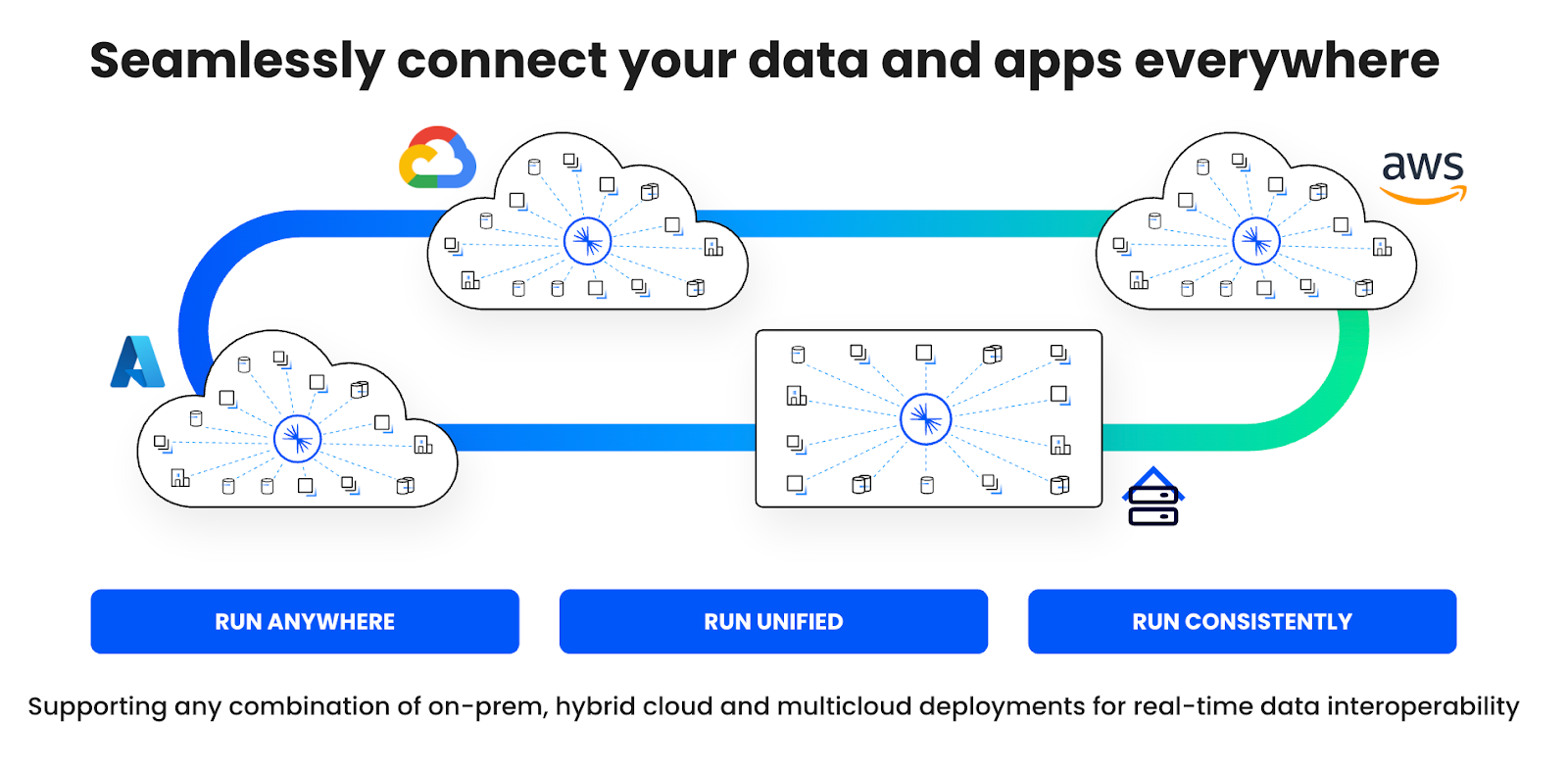
各企業向けのコスト削減予測を取得
カスタマイズされたコスト比較を取得して、Confluent Cloud と Amazon MSK の節約額を確認してください。お問い合わせフォームに必要事項をご記入の上、送信してください。担当者が Confluent を利用した場合の節約額を計算し、ご質問にお答えします。
営業担当者に相談する前に、関連リソースをご覧いただくこともできます。
Confluent Cloud vs. Amazon MSK: FAQs
Is Confluent Cloud more cost-effective than Amazon MSK?
Yes, Confluent Cloud is more cost-effective than Amazon MSK because of cost savings from:
-
Reduced infrastructure costs: Confluent Cloud’s serverless, cloud-native architecture eliminates the need for over-provisioning that is common with MSK’s node-based pricing. Features like Infinite Storage and Tiered Storage decouple compute and storage, further reducing infrastructure spending. For example, SecurityScorecard saved over $1M in infrastructure and operational costs by migrating to Confluent Cloud
-
Lower operational overhead: Offloading complex and time-consuming operational tasks—such as capacity management, scaling, and upgrades—to Confluent Cloud allows you to reallocate valuable engineering resources to innovation instead of infrastructure management. One customer reported they would have needed to hire at least 10 more people to manage Kafka themselves.
-
Minimized downtime and risk: Confluent Cloud offers a 99.99% uptime SLA for production workloads. Compared to MSK (with a 99.9% SLA with exclusions for Kafka failures and customer configuration failures), Confluent’s SLA delivers higher reliability and reduces the substantial hidden costs associated with downtime.
Choosing Confluent Cloud can reduce your self-managed Kafka costs by 40-70%.
What are the main cost drivers of Confluent Cloud vs Amazon MSK?
The main cost drivers of Confluent Cloud are:
-
Usage based consumption: Confluent Cloud’s pay-as-you-go pricing is based on actual usage (e.g., throughput) rather than provisioned infrastructure. This pay-as-you-go model eliminates the need for over-provisioned, underutilized clusters that typically lead double the infrastructure costs for self-managed Kafka vs fully managed on Confluent.
-
Managed horizontal scaling: Elastic Confluent Units for Kafka (eCKUs) are a Confluent Cloud’s unit of horizontal scalability for billing. eCKUs autoscale up and down based on workload. The cost includes the complete management of the platform, from infrastructure and scaling to monitoring and support, which is designed to reduce or eliminate the separate operational and support costs customers would otherwise incur.
The main cost drivers of Amazon MSK are:
-
Higher infrastructure spend: MSK uses node-based pricing, requiring users to pay for provisioned compute and storage, which often leads to over-provisioning to handle peak loads. Networking, particularly cross-Availability Zone (cross-AZ) traffic, can also become a significant hidden cost, sometimes accounting for 80-90% of total infrastructure expenses.
-
Self-managed operations and management: Since MSK is not a fully managed Kafka service, significant engineering resources are required for manual tasks like sizing, scaling, rebalancing partitions, patching, and monitoring. This includes the cost of hiring and retaining specialized Kafka talent.
-
Custom development and maintenance: MSK requires significant custom platform development and maintenance, which can take 2+ years to bring to production and cost $3-5M or more in costs. Because MSK is a hosted service rather than a complete platform with essential components included out-of-the-box, engineering teams must spend valuable time and resources building and maintaining their own solutions for developer tools, DevOps automation, infrastructure enhancements for reliability and disaster recovery, monitoring, integration, security controls, and governance.
-
Unplanned downtime and higher business risk: MSK's 99.9% SLA excludes failures in the underlying Kafka software, as well as failures due to customer errors in configuration, leaving customers responsible for resolving failures that can easily turn into major outages. The risk of outages due to storage limitations, manual scaling errors, or unresolved bugs can lead to substantial hidden costs, including lost revenue and reputational damage.
What are the pros and cons of MSK Serverless vs Confluent Cloud?
Confluent Cloud pros and cons include:
-
Pro: Confluent Cloud offers a complete, serverless experience that automates all operational aspects, from capacity planning and elastic scaling (to GBps+) to upgrades and monitoring.
-
Pro: Confluent Cloud goes far beyond core Kafka, providing a rich ecosystem of 120+ connectors, serverless Flink for advanced stream processing, and an enterprise-grade Stream Governance suite.
-
Pro: Confluent Cloud delivers significant cost savings through cost-efficient autoscaling and usage-based consumption (which prevents overprovisioned and underutilized clusters and cuts infrastructure costs by 50%+), lowers TCO 40-70% compared to self-managed Kafka by eliminating $1M in development and operations costs over 3 years, and with a 99.99% uptime SLA that reduces business risk.
-
Con: For smaller teams, projects with predictable workloads, or organizations that already have in-house Kafka expertise, Confluent's fully managed service and advanced features may not present a clear upfront financial advantage.
MSK Serverless pros and cons include:
-
Pro: MSK Serverless addresses some of MSK's operational challenges with pre-provisioning
-
Pro: MSK Serverless can elastically scale to a given quota without the need for manual rebalancing.
-
Pro: MSK Serverless offers unlimited storage (with a per-partition quota) without the manual configuration required by MSK Standard brokers.
-
Con: MSK Serverless has a strict throughput limit of 200MBps ingress and 400MBps egress, with no upgrade path for workloads that exceed this.
-
Con: MSK Serverless lack many mission-critical components, including a rich connector ecosystem, integrated stream processing (like Flink), and comprehensive, enterprise-grade security and governance tools.
-
Con: MSK Serverless has the same weak 99.9% SLA as MSK Provisioned, which does not cover Kafka-related failures.
-
Con: Like all MSK offerings, MSK Serverless has no multicloud support and is locked into the AWS ecosystem.
How does Confluent Cloud autoscale throughput compared to MSK?
Confluent Cloud offers true elastic, automated scaling from 0 to GBps, while Amazon MSK's elastic scaling capabilities are more limited and manual:
-
Confluent Cloud provides fully managed, automated, and elastic scaling. It can automatically scale clusters up and down from 0 to GBps+ to meet demand without interruption. Its cloud-native Kora engine uses an intelligent control plane and self-balancing algorithms to manage capacity, rebalance partitions, and eliminate the need for overprovisioning and underutilizing clusters to avoid outages. As a result, customers can save 50% or more on infrastructure costs.
-
Standard clusters on MSK Provisioned require manual sizing, scaling, and rebalancing. While you can add brokers to scale up, you cannot easily scale down and are more likely to have a large number of overprovisioned clusters at any given time. Modifying storage capacity can take anywhere from 6 to 24 hours. Express clusters on MSK Provisioned offer faster scaling and rebalancing, but it is still a manual process.
-
MSK Serverless offers some autoscaling but only within a lower quota limit (up to 200 MBps ingress and 400 MBps egress). There is no solution to upgrade beyond this quota without moving to a different offering.
How do Confluent and MSK differ in cluster provisioning speed?
Confluent Cloud can provision clusters in minutes, whereas provisioning an Amazon MSK cluster can take from 30 minutes to over an hour.
Is Confluent Cloud more reliable and performant than MSK?
Yes, Confluent Cloud is architected to be more reliable and performant than Amazon MSK and significantly reduces the risk of unplanned downtime compared to MSK:
-
Confluent's Kora engine provides native resilience with continuous monitoring, proactive replacement of degraded nodes, and automatic rebalancing to maintain availability without operator intervention. MSK lacks these native self-healing capabilities, requiring customers to manually identify and replace failed brokers.
-
Confluent Cloud offers a 99.99% uptime SLA that covers all components, including Kafka-related failures. This translates to a maximum of 0.876 hours of downtime per year. Amazon MSK offers a 99.9% SLA (a maximum of 8.76 hours of downtime per year), but that SLA explicitly excludes failures caused by the underlying Apache Kafka or Zookeeper software, placing the burden of resolving these critical issues on the customer and significant increasing the actual maximum hours of downtime per year MSK customers may experience.
Which platform offers stronger developer tooling, Confluent Cloud or Amazon MSK?
Confluent Cloud offers significantly stronger and more comprehensive developer tooling than Amazon MSK:
-
Confluent Cloud provides a robust Terraform provider that allows developers to manage both control plane resources (like clusters and Schema Registry) and data plane resources (such as Topics and ACLs). This enables complete automation of infrastructure deployments as code. Amazon MSK offers more limited IaC capabilities, as its Terraform support can only manage control plane resources. Managing data plane resources requires building custom operators and processes.
-
Confluent Cloud offers a rich set of APIs for point-and-click operations and automation. It also provides a user-friendly and intuitive cloud UI that allows developers to easily manage and monitor their Kafka clusters and data streams. MSK does not have a dedicated Kafka UI and developers must often build their own tools on top of MSK’s APIs. For example, MSK lacks a native REST proxy for non-Java clients, a feature available in Confluent.
-
Confluent Cloud supports multi-language client development, providing client libraries for several non-Java languages including C/C++, Go, Python, and .NET. Users can generate the necessary configuration details (including cluster credentials and API keys) directly from the Confluent Cloud Console and paste them into client application code. Amazon MSK also supports non-Java clients but enabling them to interact with MSK requires some additional work when setting up and configuring the clients for authentication and authorization.
Does Confluent Cloud offer better support than Amazon MSK?
Yes, Confluent provides customers with guidance from the world's foremost Kafka experts. Confluent was founded by the original co-creators of Kafka, and its support and professional services teams have millions of hours of Kafka experience. MSK support is limited and does not have the same depth of Kafka-specific knowledge.
What are the feature differences around connectors and schema management?
Confluent Cloud provides 120+ pre-built connectors and 80+ fully managed connectors, enabling instant integration with a wide range of popular data sources and sinks both inside and outside the AWS ecosystem. In contrast, Amazon MSK has very limited connector support. It offers fewer than 10 direct or "half-supported" integrations and primarily provides just the underlying Connect infrastructure, requiring users to bring, manage, and maintain their own connectors. This results in additional operational burden and cost. In fact, Confluent offers instant, fully managed connectivity to more native AWS services than Amazon MSK does.
Confluent Cloud includes Stream Governance, a comprehensive, fully managed suite that provides Schema Registry, Data Portal, Stream Lineage, and Data Quality Rules. With features like broker-side schema validation and the ability to tag data containing personally identifiable information (PII), your data streams are discoverable, trustworthy, and secure. Amazon MSK integrates with AWS Glue Schema Registry but lacks a full suite of governance tools, such as schema validation, data lineage, or a data catalog.
Does Confluent Cloud support multicloud deployments?
Yes, Confluent Cloud supports multicloud deployments. It is designed for both multicloud and hybrid environments, whereas Amazon MSK is an AWS-only service. Confluent customers can use its fully managed Kafka service on all three major public clouds and use its Cluster Linking feature to replicate data across clouds.